新世纪英语高二下unit 1 语言点汇总
- 格式:doc
- 大小:44.50 KB
- 文档页数:2
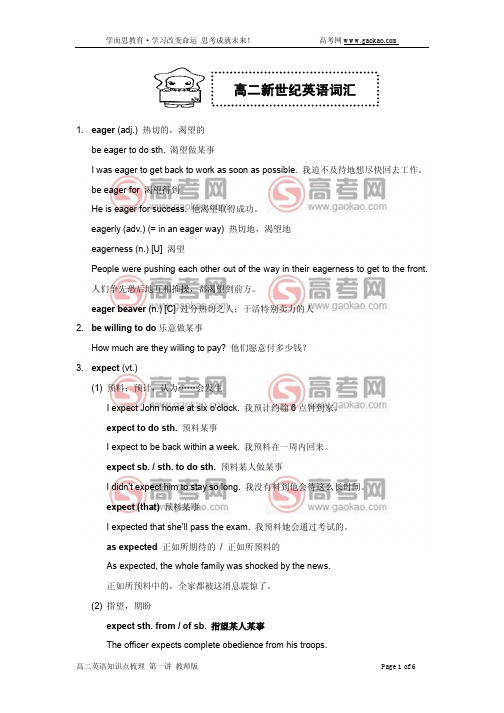
1. eager (adj.) 热切的,渴望的be eager to do sth. 渴望做某事I was eager to get back to work as soon as possible. 我迫不及待地想尽快回去工作。
be eager for 渴望得到He is eager for success. 他渴望取得成功。
eagerly (adv.) (= in an eager way) 热切地,渴望地eagerness (n.) [U] 渴望People were pushing each other out of the way in their eagerness to get to the front.人们争先恐后地互相推搡,都渴望到前方。
eager beaver (n.) [C] 过分热切之人;干活特别卖力的人2. be willing to do乐意做某事How much are they willing to pay? 他们愿意付多少钱?3. expect (vt.)(1) 预料;预计,认为……会发生I expect John home at six o’clock. 我预计约翰6点钟到家。
expect to do sth.预料某事I expect to be back within a week. 我预料在一周内回来。
expect sb. / sth. to do sth. 预料某人做某事I didn’t expect him to stay so long. 我没有料到他会待这么长时间。
expect (that) 预料某事I expected that she’ll pass the exam. 我预料她会通过考试的。
as expected 正如所期待的/ 正如所预料的As expected, the whole family was shocked by the news.正如所预料中的,全家都被这消息震惊了。
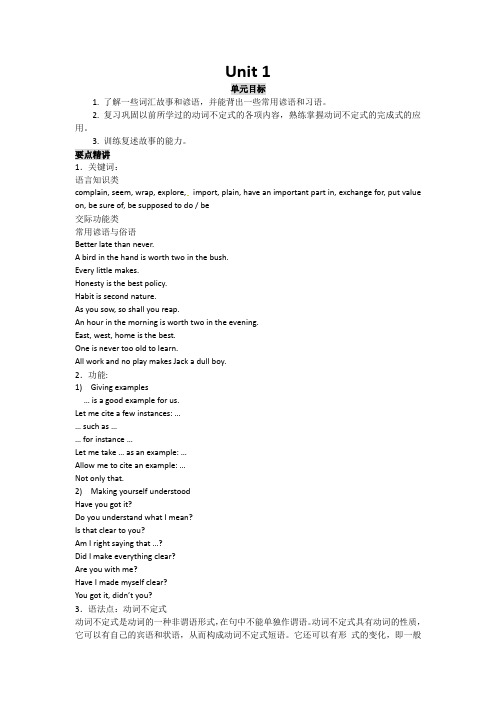
Unit 1单元目标1. 了解一些词汇故事和谚语,并能背出一些常用谚语和习语。
2. 复习巩固以前所学过的动词不定式的各项内容,熟练掌握动词不定式的完成式的应用。
3. 训练复述故事的能力。
要点精讲1.关键词:语言知识类complain, seem, wrap, explore,import, plain, have an important part in, exchange for, put value on, be sure of, be supposed to do / be交际功能类常用谚语与俗语Better late than never.A bird in the hand is worth two in the bush.Every little makes.Honesty is the best policy.Habit is second nature.As you sow, so shall you reap.An hour in the morning is worth two in the evening.East, west, home is the best.One is never too old to learn.All work and no play makes Jack a dull boy.2.功能:1) Giving examples… is a good example for us.Let me cite a few instances: …… such as …… for instance …Let me take … as an example: …Allow me to cite an example: …Not only that.2) Making yourself understoodHave you got it?Do you understand what I mean?Is that clear to you?Am I right saying that …?Did I make everything clear?Are you with me?Have I made myself clear?You got it, didn’t y ou?3.语法点:动词不定式动词不定式是动词的一种非谓语形式,在句中不能单独作谓语。
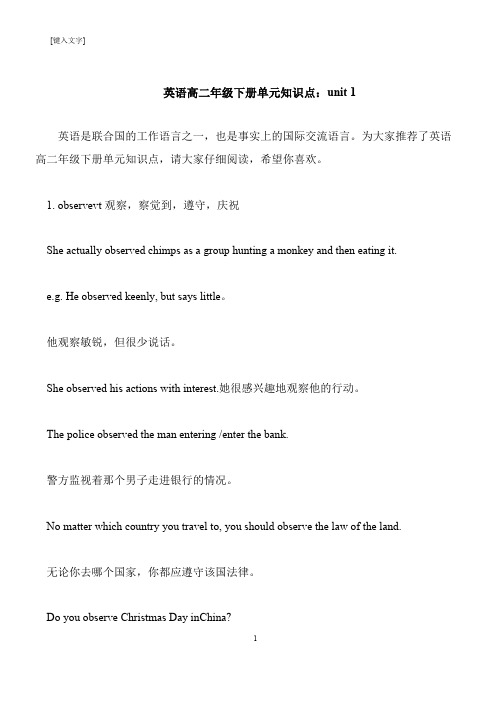
英语高二年级下册单元知识点:unit 1英语是联合国的工作语言之一,也是事实上的国际交流语言。
为大家推荐了英语高二年级下册单元知识点,请大家仔细阅读,希望你喜欢。
1. observevt观察,察觉到,遵守,庆祝 She actually observed chimps as a group hunting a monkey and then eating it. e.g. He observed keenly, but says little。
他观察敏锐,但很少说话。
She observed his actions with interest.她很感兴趣地观察他的行动。
The police observed the man entering /enter the bank. 警方监视着那个男子走进银行的情况。
No matter which country you travel to, you should observe the law of the land. 无论你去哪个国家,你都应遵守该国法律。
Do you observe Christmas Day inChina? 中国人过圣诞节吗? 注意:表示注意,观察时,observe的用法。
observe + 宾语+ do sth/ doing sth/ done 接省去to的动词不定式作宾补,表主动,表动作经常性,或已经过去。
接doing,表主动,表动作正在进行。
接过去分词,表被动,表动作已经过去。
e.g. His neighbour observed a stranger go/going into his house. 他的邻居看到一个陌生人进入他家。
She observed a monkey eaten by the chimps. 她观察到一只猴子被黑猩猩吃掉。
相关词汇: observern.观察者,遵守者,评论者 observationn.观察,评论 辨析:notice, observe, watch, catch sight of notice是及物动词,表示注意到、无意中发现。
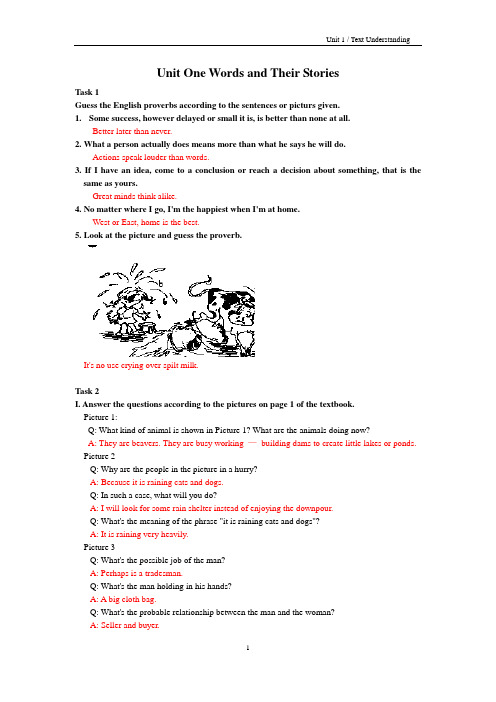
Unit One Words and Their StoriesTask 1Guess the English proverbs according to the sentences or picturs given.1.Some success, however delayed or small it is, is better than none at all.Better later than never.2. What a person actually does means more than what he says he will do.Actions speak louder than words.3. If I have an idea, come to a conclusion or reach a decision about something, that is the same as yours.Great minds think alike.4. No matter where I go, I'm the happiest when I'm at home.West or East, home is the best.5. Look at the picture and guess the proverb.It's no use crying over spilt milk.Task 2I. Answer the questions according to the pictures on page 1 of the textbook.Picture 1:Q: What kind of animal is shown in Picture 1? What are the animals doing now?A: They are beavers. They are busy working —building dams to create little lakes or ponds. Picture 2Q: Why are the people in the picture in a hurry?A: Because it is raining cats and dogs.Q: In such a case, what will you do?A: I will look for some rain shelter instead of enjoying the downpour.Q: What's the meaning of the phrase "it is raining cats and dogs"?A: It is raining very heavily.Picture 3Q: What's the possible job of the man?A: Perhaps is a tradesman.Q: What's the man holding in his hands?A: A big cloth bag.Q: What's the probable relationship between the man and the woman?A: Seller and buyer.Q: What does the woman want to buy?A: A pig.Q: What are in the bag?A: Some cats.Q: Why did the man put cats in the bag instead of pigs? (open answers)Task 3I. Skim the first story and then tell the answers:1. Which paragraph(s) show(s) us the meaning and origin of an expressions that describes ahard-working person?A, B, C and D.2. Which paragraph(s) show(s) the role played by a special animal in the history of a country?E, F and G.Task 4Scan the first story and tell whether the following statements are "True" or "False".1. The phrase "eager beaver" usually refers to an animal which is quite diligent. F2. According to the text, the students who complain about too much homework are eager beavers.F3. Beavers look quite lovely and beautiful. F4. Beavers can create little lakes by themselves. T5. Beavers are of great economic values to mankind. T6. Nowadays beavers help a lot in the development of the western territories of the U.S. FTask 5Skim the second story and then tell the answers:1.Which paragraph(s) introduce(s) a word that is simple but is used in some unusualexpressions?H.2.Which paragraph(s) tell(s) us the origins of two expressions that have the dame word ineach?I, J, L and L.Task 6Scan the second story and tell whether the following statements are "True" or "False".1. The word "bag" has many other meanings besides referring to a container that is used to carryarticles. T2. When you are sure to lose the match, you can say: "The match is in the bag". F3. The phrase " to let the cat out of the bag" came from folklore (民间传说). T4. It's out-of-date to use proverbs nowadays. FTask 7Group WorkFind an expression or a proverb you like and try to tell a story about the origin of it.。
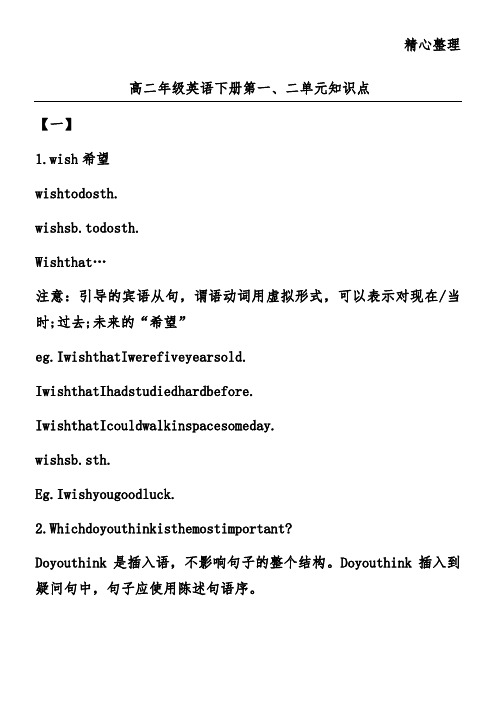
精心整理高二年级英语下册第一、二单元知识点【一】1.wish 希望/当时;2.Whichdoyouthinkisthemostimportant?Doyouthink 是插入语,不影响句子的整个结构。
Doyouthink 插入到疑问句中,句子应使用陈述句语序。
Eg.HowmuchdoyouthinkIshouldpayforthebook?3.ifso倘若是(那样的话)……eg.Ifso,Iwon’taskyouforhelp.4.Howdoyouimprovesociety?5.Icontain意思是(全部)容纳Eg.Ilostmywalletwhichcontained200dollars,includingtwocoins.7.setup建立,指“搭建并成立”eg.Wesetupanewschoolandthestudentstherewereveryhappy.putup单纯指“搭建”Eg.Theyputupanewhouse.found“成立,建立”,尤指“国家、组织等”的建立Eg.ThePeople’sRepublicofChinawasfoundedin1949.thesucceed是动词succeedindoingsth.介词in不可省略11.…isoneofthosewhohavereturnedtoChinaafterstudyingandwork ingabroad.abroad是副词。
副词作定语需后置。
Eg.Ihavealotoffriendsathomeandabroad.我有很多国内国外的朋友。
goabroad出国12.…andworkwithsomeofthetopscientists…comeAll\both\everyone\everything用于否定结构中表示部分否定。
Eg.Noteveryonelikesthefilm.并非每个人都喜欢这个电影。
16.Wearenotmakingthatmuchmoneyyet.That此处相当于so,表程度。
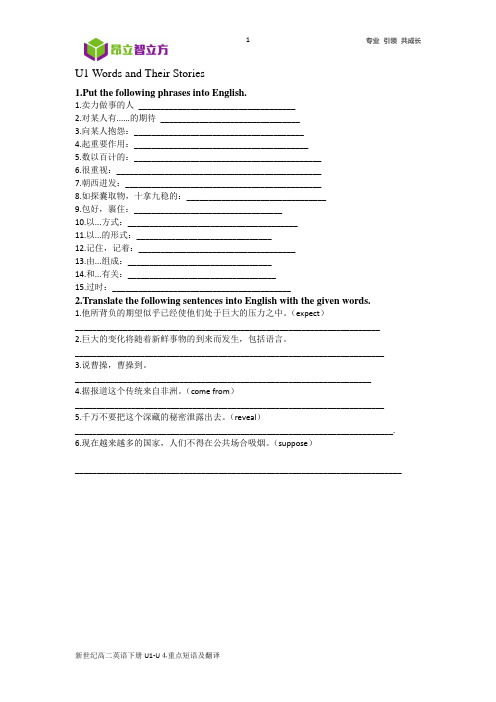
U1 Words and Their Stories1.Put the following phrases into English.1.卖力做事的人____________________________________2.对某人有......的期待________________________________3.向某人抱怨:_______________________________________4.起重要作用:________________________________________5.数以百计的:___________________________________________6.很重视:_______________________________________________7.朝西进发:_____________________________________________8.如探囊取物,十拿九稳的:________________________________9.包好,裹住:__________________________________10.以...方式:_______________________________________11.以...的形式:_______________________________12.记住,记着:____________________________________13.由...组成:_________________________________14.和...有关:__________________________________15.过时:_________________________________________2.Translate the following sentences into English with the given words.1.他所背负的期望似乎已经使他们处于巨大的压力之中。
Unit One Words and Their StoriesLeading inTeaching Objectives:Language Objectives:To help the students learn the new words and expressions and understand the text.Skill Objectives:To improve the students’ various reading skills such as skimming and scanning.To develop the students’ ability to look for detailed informationEmotional Objectives:To be aware that people should make resolutions to change not only their lives but also the world.To understand the importance of the New Year.Teaching AidsThe notebook, the projectorI Warming upTalk about the translation of some words both in Chinese and English.金饭碗—1. gold rice bowl2. a well-paid and steady occupation★老黄牛— honest and hardworking peopleIt rains cats and dogs—It rains heavilyUncle Sam—Americaeager beaver—willing/excitedToday we are going to learn a new lesson—Words and Their StoriesII. Eager Beaver1. Listen to the tape. Figure out how many aspects are talked about in this part.the meaning of eager beaverthe origin of this expressionthe role of beaver in history2. Read the text aloud. Match the three aspects with paragraphs3. Read paragraph CD, pick out the words to describe beaverslive in waterbuild dams--- cut down treesremove branchesput branches across streamspack mud on branches4. Read para EFG, pick out the words to describe the role of beaversplay an important role in…put great value on…be used as moneysearch for beaversexplore western territoriesbecome villages…5. Retell the text if time permitting.III It’s in the BagRead the text by yourselves and figure out the words and their meaningsIV Finish exercise B on P2 and exercise C1 on P3Unit One Words and Their StoriesPhrases and Vocabulary1. an eager beaver2. sb be willing to do sth sb be unwilling to do sth=be reluctant to do sth3. sb do what is expected of him sb expect sth of sb 指望从某人处得到某物Don’t expect the house of me!You can always expect help of Jack.4. suppose: ★sb be (not) supposed to do sth/to have done sth/ to be doing sth 应当、理应eg. John is supposed to have graduated.She was not supposed to cheat in examinations.★Suppose that sb do sth. eg. Suppose you are in America.Suppose you can drive.★Supposing that sb do sth, S+V+Oeg. Supposing you can swim, will you help me?★Sb suppose that sb do sth 猜想eg. I suppose Tom has finished homework, right?I suppose he won’t come.5. sb solve problems=sb work out problems=settle problems★sb settle down to doing sth= sb sit down to doing sth6. complain: ★sb complain about sth to sb★sb make a complaint to sb about sth★sb do sth without any complainteg. Tom complained about his hair to his mother.He had his hair cut without any complaint.7. protest: ★sb protest against sth★sb make a protest against stheg. People sleep on streets to protest against their president.People make a protest against Obama’s policy.8. sb be said to do sth/to have done sth/ to be doing sth=It is said that sb do sth9. sth come from sth10. strange-looking creatures11. sb cut down trees12. sb remove branches13. sb pack mud on the branches14. sb make the dams solid15. sth have/play an important part in sth= sth have/play an important role in stheg. Newton played an important role in the development of science.16. the settlement of North America17. European settlers18. ★sb put great value on sth.★sth be of great value = sth be valuable19. sth be used as sth20. sb look for adventure21. sb head west22. sb search for sth23. in one’s search24. sb explore the western territories25. the trading posts26. sb exchange sth for sth27. a number of sth28. sth be widely used29. sth be imported from spl sth be exported into spl30. sb be sure of sthsure/certain: 区别:只有it is certain that/it is not certain whether、wh- 无sure31. sb seem to do/to have done/to be doing32. sth arrive with sth33. ★sth be wrapped up★sb wrap sth in sth★sb be wrapped up in sth=sb be absorbed in sth=sb be lost in sth=sb throw oneself into sth eg. Don’t disturb him. He is wrapped up in the movie.34. sb reveal a well-kept secret35. ★sth remain in spl★sth remain adj/n eg. The Spring Festival remains important in China★the remaining sth36. sb hold up sthUnit One Words and Their StoriesAdditional Reading English ProverbsTeaching Objectives:Language Objectives:To help the students learn the new words and expressions and understand the text.Skill Objectives:To improve the students’ various reading skills such as skimming and scanning.To develop the students’ ability to look for detailed informationEmotional Objectives:To be aware that people should make resolutions to change not only their lives but also the world.To understand the importance of the New Year.Teaching AidsThe notebook, the projectorI. Read the text in 5 minutes.Finish exercise I on P12II. Talk about the proverbs and their Chinese meaning.III. Students raise questions about some difficult points and discuss with their partners.IV. Pick out some important phrases.Phrases:1. sth refer to sth 涉及、参考、适用于eg. This rule only refers to special cases.This book refers to 4 types of crime.If you want further information, you can refer to this book.2. sth present a moral3. S+V+O in a short and brief manner4. sb work rhyme5. sth come out in the form of…以..形式出现= appear=turn upsth come out to be sth 结果是6. dictionaries of proverbs7. sth fall into 3 main categories. 分为三类8. sth take the form of sth 以..形式出现9. abstract statements10. general truths 真理11. there is some truth in both proverbs12. sb keep sth in mindsb keep in mind that S+V+O13. Never use proverbs out of context14. specific observations from everyday experience15. sb make a general point 提出一个观点16. sth consist of sth17. traditional customs and beliefs 传统风俗和信仰18. sth be related to sth19. sb hold the opinion that S+V+O=sb think that20. sth go out of fashion21. sth fall into disuse22. A saying going “S+V+O”23. S+V+O as usual24. sb be to do sth。
高二年级英语下册第一、二单元知识点【一】1.wish希望wish to do sth.wish sb. to do sth.Wish that…注意:引导的宾语从句,谓语动词用虚拟形式,可以表示对现在/当时;过去;未来的“希望”eg. I wish that I were five years old.I wish that I had studied hard before.I wish that I could walk in space some day.wish sb. sth.Eg. I wish you good luck.2. Which do you think is the most important?Do you think 是插入语,不影响句子的整个结构。
Do you think 插入到疑问句中,句子应使用陈述句语序。
Eg. How much do you think I should pay for the book?3. if so倘若是(那样的话)……eg. If so , I won’t ask you for help.4.How do you improve society?society“社会”,使用时不加冠词。
Eg. The thief is dangerous to society.5. It is likely that many of them will be born in …likely 是形容词,与possible 意思相同,但possible只可用于这样的结构:it is possible that…;likely还可:sb. be likely to do eg. He is likely to win the game.6. It is home to the Chinese Academy of Sciences and more than ten famous universities, including Peking University and Tsinghua University include“包括”,指“部分包含”,划线部分还可以:Peking University and Tsinghua University includedcontain意思是(全部)容纳Eg. I lost my wallet which contained 200 dollars, including two coins.7. set up建立,指“搭建并成立”eg. We set up a new school and the students there were very happy.put up单纯指“搭建”Eg. They put up a new house.found “成立,建立”,尤指“国家、组织等”的建立Eg. The People’s Republic of China was founded in 1949.8. in the late 1990’s在二十世纪90年代后期,在年代前的冠词the 不能省略。
高二下第一单元英语知识点一、动词的时态和语态动词的时态主要包括一般现在时、一般过去时、一般将来时、现在进行时、过去进行时、过去将来时、现在完成时、过去完成时等。
1. 一般现在时:表示经常性或习惯性的动作或状态。
例如:I go to school every day.2. 一般过去时:表示过去某个时间发生的动作或状态。
例如:She studied English yesterday.3. 一般将来时:表示将来发生的动作或状态。
例如:They will visit their grandparents next weekend.4. 现在进行时:表示现在正在进行的动作。
例如:I am readinga book now.5. 过去进行时:表示过去某个时间正在进行的动作。
例如:He was playing football when I called him.6. 过去将来时:表示过去某个时间应该发生但实际未发生的动作或状态。
例如:I thought you would come to the party, but youdidn't.7. 现在完成时:表示过去某个时间发生的动作对现在造成的影响或结果。
例如:She has finished her homework.8. 过去完成时:表示过去某个时间之前已经发生的动作或状态。
例如:By the time I arrived, they had already left.动词的语态主要包括主动语态和被动语态。
被动语态表示动作的接受者或承受者。
9. 主动语态:主语是动作的发出者。
例如:She sings a song.10. 被动语态:主语是动作的接受者或承受者。
例如:A song is sung by her.二、名词名词是指人、事物、地方等的名称,分为可数名词和不可数名词。
1. 可数名词:表示可以计数的事物。
可数名词有单数和复数之分,可数名词的复数形式的构成方法有规律,如在名词的末尾加-s 或-es。
上海新世纪英语高二全部课文<包括AdditionalReading)及重点词组高二第二学期17. Words and their stories18. English proverbs19. Tips on making a public speech20. Keep it short for the audience’s sake21. Making friends22. What does friendship mean to westerners?23. Adjo24. Ryan, his friends, and his incredible torch runb5E2RGbCAP25. The father of modern physics26. The survival of the fittest27. Miracle in the rice field28. Newton’s three important laws29. Oliver wants more (Adapted from Oliver Twist Charles Dickens>p1EanqFDPw30. Enjoy the classics31. Is she guilty? (Adapted from The Prince and the Pauper Mark Twain>DXDiTa9E3d32. Mark Twain高二第二学期17. Words and their storiesEAGER BEAVER An eager beaver is a person who is always willing to do and is excited about doing what is expected of him.RTCrpUDGiTSuppose, for example, that a teacher tells his students they each must solve one hundred math problems before coming to school the next day. The children complain about so much homework. But one student does not protest at all. That student is an eager beaver. He loves to do math problems, and does not mind all the homework.5PCzVD7HxAThe expression is said to have come from the name of a hard-working animal---the beaver.jLBHrnAILgBeavers are strange-looking creatures. They spend a lot of time in the water, building dams to create little lakes or ponds. They use their huge teeth and work hard to cut down trees, remove branches and put them across streams. They use their tails to pack mud on the branches to make the dams solid. Few other animals work so hard.xHAQX74J0XHistorians say the beaver had an important part in the settlement of North America.LDAYtRyKfEThere were hundreds of millions of beavers when European settlers first arrived. The settlers put great value on the fur of beavers. In fact, for two hundred years or more, beavers provided the most valuable fur in North America. Beaver skins often used as money.Zzz6ZB2LtkYoung men looking for adventure headed west across the country to search for beavers. In their search, they explored much of the western territories. The trading posts, where they exchanged beaver skins for the goods they needed, became villages, and later towns and cities.dvzfvkwMI1IT’S IN THE BAG The bag---one of the simplest and most useful things in every man or woman’s life---has given the world many strange expressions that are not very simple. A number of these expressions are widely used in the United States today. Some were imported fromEngland a long time ago.rqyn14ZNXIWhen you are sure of something, you can say, “It’s in the bag.”EmxvxOtOcoThis phrase seemed to have arrived with the modern paper bag. Before, Americans used to say, “It’s all wrapped up.”Then, things you bought were wrapped in plain brown paper, or sometimes in old newspaper.SixE2yXPq5Another widely used expressions is “to let the cat out of the bag”, meaning to reveal a well-kept secret.6ewMyirQFLNo one can explain how the cat got into the bag, or why it remained there. But there is an old story about it. Long ago tradesman sold things in large cloth bags. Once a woman asked for a pig. The tradesman held up his cloth bag. Inside there was supposed to be a live pig. The woman asked to see it. When the dishonest tradesman opened the bag, out jumped a squealing cat, not a pig. The tradesman’s secret was out: he was tricky, and now everybody knew it.kavU42VRUs18. English proverbsCharactersTeacher of English: Ms Smith (MS>Students: Li (LI>, Mao (MA>, Anne (AN>, Rivera (RI>y6v3ALoS89MS: Good morning, everyone. I hope you all know what we are here for. The topic of our discussion this morning is “English Proverbs”.M2ub6vSTnPLI: So, I’m in the right group.MA: Me, too.RI: Me, too.MS: But I was told we would have four…and yet…AN: I’m coming. Good morning. Am I late?MS: Morning. “Speak of angels and you hear their songs.”0YujCfmUCwAN: Is that a proverb referring to my coming?MS: Exactly.LI: We have a saying in Chinese, which I think is very close in meaning…eUts8ZQVRdMA: Speak of Cao Cao and he appears.MS: Right. Well, “first things first”. A proverb is a traditional saying which offers advice or presents a moral in a short and brief manner. A proverb normally is a sentence, into which the writer often works rhyme. For instance, “East or west, home is best.” Sometimes it comes out in the form of a phrase.sQsAEJkW5TMA: I’ve seen dictionaries of proverbs.MS: Well, there are thousands of proverbs. They fall into three main categories. Those of the first type take the form of abstract statements. They express general truths. Here are two good examples: “One is never too old to learn.”and “A man who neglects his studies in youth will regret it in later years.”GMsIasNXkARI: I think there is some truth in both proverbs. To encourage a person who has had little education for some reason as a young man, we may use the former. With us, I guess the latter works.TIrRGchYzgMS: So you have to keep this in mind. Never use proverbs out of context. “One man’s meat is another man’s poison.”7EqZcWLZNXLI: I see. Then, what is the second type?MS: The second type uses specific observations from everyday experience to make a general point.lzq7IGf02EAN: “Don’t put all your eggs in one basket.” Does it fall into the second category?zvpgeqJ1hkMS: You’re right, dear. Then the third type consists of sayings from particular areas of traditional customs andbeliefs. “After dinner, rest a while。
Unit 1.汇总
I. Word transformation:
1. willing (adj.) ---willingness(n.)
2. expect (v.)---expectation (n.)---unexpected (adj.)
3. complain (v.)---complaint (n.)
4. explore(v.)---exploration (n.)
5. settle(v.)---settlement(n.)
6. history (n.)---historian (n.)---historic/historical (adj.)
7. adventure (n.) --- adventurous (adj.) 8. value(n.)----value(v.)----valuable/valueless
9. import(v.)---imported(adj.) 10. complain (v.) ---- complaint(n.)
III. Phrases:
1. complain to sb. about/of sth. complain to sb. that…向某人抱怨。
make a complaint about sth.
2. a strange-looking man
3. a muddy road 一条泥泞的小路
4. in the history of 在。
的历史上
5. a historical figure/site 历史人物/遗迹
6. a historic event 具有历史意义的事件
7. settle down 定居下来/settle down to doing 定下心来做某事
8. import sth. from…从…进口…到
9. imported goods 进口商品
10. reach a settlement 达成协议
11. a live pig/fish 一头活猪/一条活鱼
12. be televised/broadcast live 现场电视转播/现场广播
13. cut down trees 砍伐树木
14. put value on =lay/place value on=value 重视,定价
15. trading post 贸易站
16. exchange A for B 交换
17. exchange sth. for sth. 用…与…进行交换
18. exchange sth. with sb. 用…与某人进行交换
19. be sure of sth. =be sure about sth. 对…有把握
20. be sure to do sth. 说话人肯定…
21. be supposed to be/do 应该;被期望或被要求(是/做某事),被认为…,理应
22. eager beaver 卖力工作的人
23. be willing to do sth. =be ready to do sth. 乐意做某事
24. be excited about doing sth. 对于做…很兴奋
25. expect sth. of sb. 期待某人…
26. expect sb. to do sth. 期待某人做某事
27. beyond our expectation
28. solve math problems =settle/work out math problems 解决数学题目
29. Sb./Sth. be said/ reported/believed to do/be…(据说/报道/据信)
30. come from 来自于
31. have an important part in=play an important part in 在…中起着重要的作用
32. hundreds of millions of…数以百万计的
33. use…as…把…用作…
34. head west 向西进发
35. It’s in the bag. 稳操胜券
36. be widely used 得到广泛应用
37. refer to 提到,谈及,参看
38. reference books 参考书
39. for reference 作为参考
40. one’s neglect of duty. 玩忽职守
41. regret doing sth. 后悔做过某事
regret not doing sth. 后悔没做某事
42. regret to tell you 遗憾地要告诉你…(还没告诉)
regret to say 遗憾地要说…(还没说)
regret to inform you…. 遗憾地要通知你…(还没通知)
regret to hear…听到…很难过
43. specific information 确切的细节
44.After careful observation 经过仔细观察45.in a manner 以…的方式
46.fall into 属于,可分成47.take the form of 以…的形式呈现48.keep…in mind=bear…in mind 记住,记着
49.consist of=be made up of=be composed of 由。
组成
50.out of fashion 过时,不再流行in fashion 流行
Sentences:
1.An eager beaver is a person who is always willing to do and is excited about doing what is
expected of him.
2.The expression is said to have come from the name of a hard-working animal--- the beaver.
3.Young men looking for adventure headed west across the country to search for beavers.
4.The trading posts, where they exchanged beaver skins for the goods they need, became
villages, and later towns and cities.
5. A number of those expressions are widely used in the United States today.
6.Things you bought were wrapped in plain brown paper, or sometimes in old newspapers.
7. 我们的老师非常重视我们的良好学习习惯的养成。
Our teachers put great value on the forming of our good study habits.
7.In some cases, parents’ disappointment comes from expecting too much of their children.
有时候,父母的失望来自于对他们的孩子期望过高。
9. Many people headed west to search for gold 很多人朝西部进发去淘金。
8.Many customers complained to the manager that the electric fans were of poor quality. 许多顾客对经理抱怨电风扇的劣质。